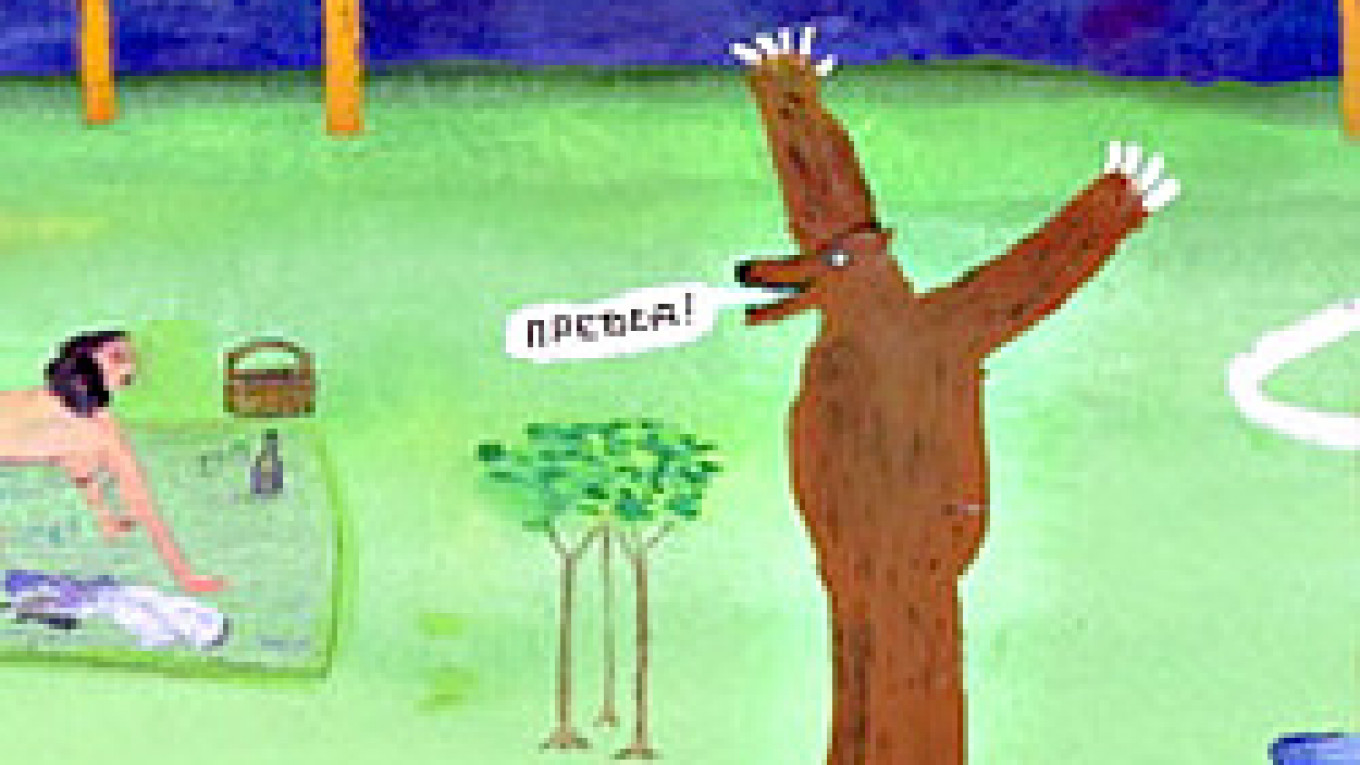This phenomenon has a curious, unexpected origin. There is a U.S. artist -- in the broadest sense of the word -- named John Lurie. A true Renaissance man, Lurie has acted in movies, including some by Jim Jarmusch; led a rock band called the Lounge Lizards; and hosted a documentary television series called "Fishing With John," which was a cult hit in the early 1990s. Recently, he started exhibiting paintings too. His style can be called primitivist or naive, and the captions on his pictures are often as important as the images themselves (an eloquent example is "Harry Didn't Want To Say Anything, But The Appearance Of Jesus Was Ruining His Vacation"). One of his pictures shows a couple making love in a forest clearing, and a bear, standing in front of them on its hind legs, with its paws raised luxuriantly in the air, saying "SURPRISE" in a speech bubble.
The picture, titled "Bear Surprise," was posted anonymously on a Russian web site, with "Surprise" replaced by "Preved." Now, this manner of deliberate misspelling has been developing for a while in the Russian Internet circles, and a whole new slang has sprung up within the last couple years. Unlike English-based netspeak ("gr8," "2 die 4"), it is not functional in the least. Its purpose is twofold: to be funny by deviating as far as possible from the correct spelling, and, perhaps, to cover up the author's lack of grammatical knowledge.
The Preved picture gained vast popularity with the speed of an avalanche. Some web users formed an online community devoted solely to variations on the theme. These included any situations with an unexpected development (from the resurrection of Christ to the appearance of Darth Vader) or any situations involving bears (understandably abundant in Russian folklore).
It is curious to see how the Russian Internet community still gets some of its impetus from the United States. One such development happened when a young American wandered into a Russian blog and wrote that he couldn't understand the script or language, which he mistook for Albanian, and received thousands of replies advising him to "learn Albanian." Since then, Russian netspeak has often been dubbed "Albanian." And now the famous Preved phenomenon can also be ultimately traced back to an American source.
A Message from The Moscow Times:
Dear readers,
We are facing unprecedented challenges. Russia's Prosecutor General's Office has designated The Moscow Times as an "undesirable" organization, criminalizing our work and putting our staff at risk of prosecution. This follows our earlier unjust labeling as a "foreign agent."
These actions are direct attempts to silence independent journalism in Russia. The authorities claim our work "discredits the decisions of the Russian leadership." We see things differently: we strive to provide accurate, unbiased reporting on Russia.
We, the journalists of The Moscow Times, refuse to be silenced. But to continue our work, we need your help.
Your support, no matter how small, makes a world of difference. If you can, please support us monthly starting from just $2. It's quick to set up, and every contribution makes a significant impact.
By supporting The Moscow Times, you're defending open, independent journalism in the face of repression. Thank you for standing with us.
Remind me later.


